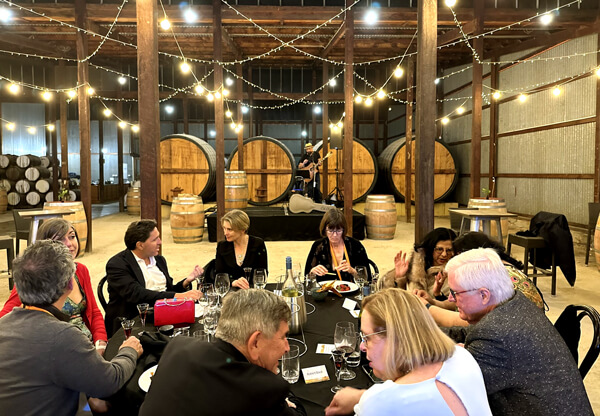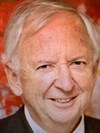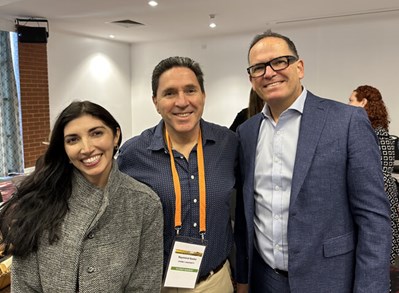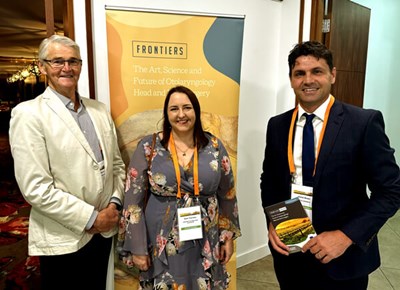
Conference attendees at the Seppeltsfield winery.
 Clinical Prof Harvey Coates, AO, Perth, Australia.
Clinical Prof Harvey Coates, AO, Perth, Australia.
Focusing on the “art, science and future of otolaryngology, head and neck surgery,” the biennial research meeting of the Garnett Passe and Rodney Williams Memorial Foundation has been responsible for a leap in the quality and quantity of basic and clinical research in Australia and New Zealand since its foundation in 1998. In an environment of fine vineyards and wines, the outstanding programme of the 13th Frontiers meeting highlighted the diversity of research being conducted currently.
 The keynote speakers were Dr Zara Patel from Stanford University (right, with Professors Raymond Sacks and Peter Friedland) and vestibular implant researcher Dr Charley Della Santina from Johns Hopkins School of Medicine.
The keynote speakers were Dr Zara Patel from Stanford University (right, with Professors Raymond Sacks and Peter Friedland) and vestibular implant researcher Dr Charley Della Santina from Johns Hopkins School of Medicine.
Professor Patel’s talk on the impact of smell on human interaction, exploring anosmia and its sequelae, was well received. Before the pandemic, 10 million Americans were anosmic and an additional 10 million became anosmic following COVID-19. She reported that 15.5% had persistent anosmia for six months or more. It affected quality of life significantly, with 50% of patients describing anger, 47% isolation and 40% noting depression as well. The presentation noted that anosmia predicts neurodegeneration in Parkinson's and Alzheimer’s diseases.
Dr Charley Della Santina gave a fascinating discussion of the effect of severe vestibular disability and the results of vestibular implantation mainly for gentamicin ototoxicity. Three electrodes were inserted into each of the three semicircular canals and of the 13 patients who had vestibular implantation, nine had useful hearing on the implanted side while four did not. All patients reported improved quality of life with reduction in either chronic dizziness, difficulty walking and oscillopsia.
 Dr Claire Frauenfelder from Adelaide discussed outcomes of a large cohort of head and neck cancer patients in Australia and New Zealand who were admitted to intensive care over a 16-year period, noting a less than 1% mortality rate. She concluded that specialised head and neck care units might be an alternative.
Dr Claire Frauenfelder from Adelaide discussed outcomes of a large cohort of head and neck cancer patients in Australia and New Zealand who were admitted to intensive care over a 16-year period, noting a less than 1% mortality rate. She concluded that specialised head and neck care units might be an alternative.
Pictured: Dr Ian Wallace, Dr Ruth Thornton and Dr Dan Brown.
Dr Chao Wang from University of Sydney described the use of artificial intelligence and machine learning to differentiate between migrainous vertigo and Ménière’s syndrome. Dr Brent Edwards, Head of National Acoustic Laboratories, presented on the improved quality of life for 304 cochlear implanted who had 340 sound processors upgraded in the first international study on this subject. There were also interesting multi-disciplinary discussions on Ménière’s, sleep medicine and leadership and diversity.
 Poster presentations included a finding of Chlamydia pneumoniae as an invasive olfactory bulb infection being a possible cause of Alzheimer’s disease. (Memories of Perth Nobel Laureates Robin Warren and Barry Marshall and helicobacter in peptic ulcer disease!)
Poster presentations included a finding of Chlamydia pneumoniae as an invasive olfactory bulb infection being a possible cause of Alzheimer’s disease. (Memories of Perth Nobel Laureates Robin Warren and Barry Marshall and helicobacter in peptic ulcer disease!)
The social aspects of the meeting focused on wine, good food and networking, with the conference dinner at a local winery. Overall, one of the best Frontiers meetings ever. The next Frontiers meeting will be held in Hobart in November 2025.



